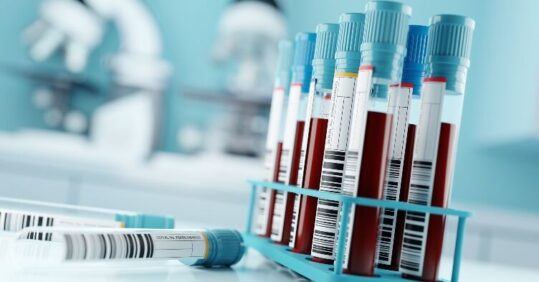Over 100k volunteer to trial blood test that detects over 50 cancers

More than 140,000 people have taken part in the world’s largest trial of a blood test that can detect more than 50 types of cancer, NHS England has reported.
NHS chief executive Amanda Pritchard said reaching 140,000 blood tests ‘marks an important milestone in our long-term efforts to catch and treat cancer earlier.’
She said: ‘We know that certain cancers are harder to detect and a late diagnosis can be devastating for patients and their families, and this trial means thousands could benefit from a diagnosis even before symptoms appear.’
Those joining the trial were aged 50 to 77 years old and did not have signs of cancer at the time of enrolment.
The test works by finding chemical changes in fragments of DNA that shed from tumours into the bloodstream.
‘Initial research has shown that this blood test could help to detect cancers that are typically difficult to identify early – such as head and neck, bowel, lung and pancreatic cancers,’ NHS England said.
Related Article: Measures to prevent cancer would be cost-effective, suggests economic report
As well as the trial being ‘a major step in NHS efforts to catch cancers sooner,’ NHS England said, ‘particular efforts to achieve representation of people from minority ethnic backgrounds, who are often less likely to take part in medical research studies,’ have also been made.
While it is ‘too early’ to report on the results of the trial, NHS England said, ‘a number of participants have been referred for urgent NHS cancer investigations following the detection of a cancer signal.’
Sir Harpal Kumar, president of GRAIL Europe, the healthcare company that developed the Galleri blood test, explained that the ‘test results can provide clinicians with an accurate prediction of where the cancer is located in the body,’ and the test has a ‘low rate of false positives,’ which makes the company ‘hopeful that it will work well alongside existing cancer screening in the UK.’
He said: ‘The results of this trial will be key to our understanding.’
Participants will now be invited to attend two further appointments, spaced roughly 12 months apart.
‘It is vital trial participants attend their follow up appointments, so researchers can understand whether the test could be used in the future as part of the NHS cancer screening programme,’ NHS England said.
Professor Charles Swanton, co-chief investigator for the NHS-Galleri trial, explained that ‘whilst the first year of the trial may pick up cancers that have existed for some time, the second and third years provide the best opportunity to explore the expected benefits of picking up new cancers at an early stage when treatment is generally more successful.’
He said ‘this will help us work out how the test might be used alongside the existing NHS cancer screening programme.’
The NHS Long Term Plan is committed to increasing the proportion of cancers caught early, when they are easier to treat, from half to three in four.
‘Thanks to national NHS campaigns and early diagnosis initiatives, urgent cancer referrals have been at record levels over the past 12 months – almost one fifth higher than before the pandemic,’ NHS England said.
More than 2.6 million people were referred between April 2021 and March 2022, and over 670,000 people have started treatment since March 2020, it said.
Related Article: Mythbuster: ‘I don’t need a smear test – I’ve had my HPV jab’
NHS ‘one stop shops’ have delivered more than one million checks and tests, including for cancer, since the rollout began, NHS England said, with over 90 community diagnostic centres offering MRI, CT and other services closer to patients’ homes.
‘This trial is part of radical NHS action to tackle cancer, that also includes high street pharmacies spotting signs of cancer and sending people for checks, drones delivering chemotherapy, and roaming lung and liver scanning trucks going into communities,’ it explained.
‘Set to begin later this year, staff in high street pharmacies will be funded to spot signs of cancer and will be able to send people directly for scans and other checks, as part of an initiative to catch tumours early when they are easier to treat.’
Ms Pritchard said: ‘The NHS will not stand still in our efforts to catch cancer earlier and save more lives, rolling out new and innovative ways to detect cancers sooner; from roaming liver trucks, to genetic testing and high street checks, we want to make it as easy as possible for those most at risk to get vital, lifesaving tests.’
The NHS-Galleri trial is being run by Cancer Research UK and King’s College London Cancer Prevention Trials Unit in partnership with the NHS and GRAIL Europe.
Mobile clinics will return to towns and cities from September this year and will follow up with volunteers approximately one year after their initial appointment, NHS England said.
If successful, it said it plans to roll out the test to a further one million people across 2024 and 2025.
Related Article: Smoking rates fall most significantly in the North of England

See how our symptom tool can help you make better sense of patient presentations
Click here to search a symptom




